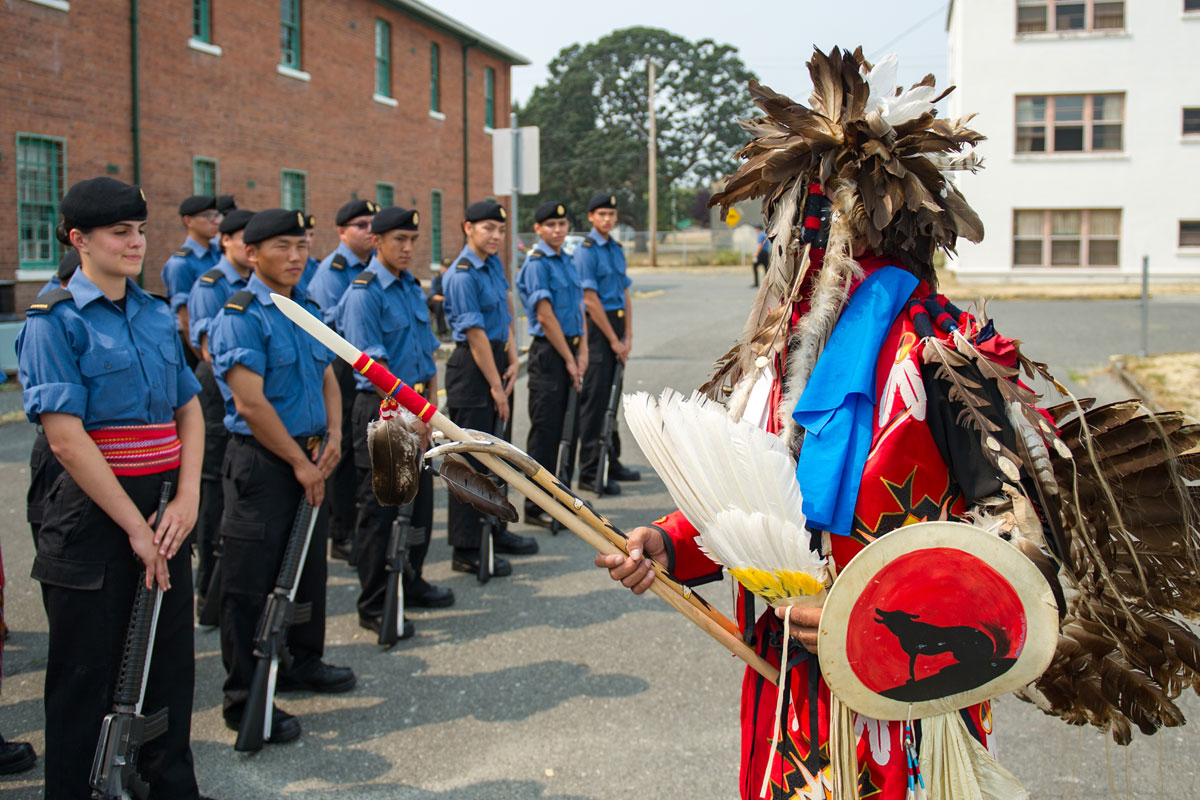Culture plays a big role in success of Aboriginal program
By Lookout on Sep 08, 2018 with Comments 0

Joe Thorne, a traditional dancer from Cowichan Nation, blesses the candidates before The Raven Program Graduation ceremony Aug. 14. Photo by LS David Gariepy, MARPAC Imaging Services
A/SLt Jesse Grigor, Naval Fleet School (Pacific) ~
Students who choose to enter the Aboriginal Youth Program with the Canadian Armed Forces (CAF) undergo four days of cultural awareness training prior to starting basic training.
Providing cultural awareness education, and practicing ceremonies and rituals are critical components to bridging students coming from Aboriginal communities across Canada into the CAF.
“It’s important to remind them who they are, to develop a sense of pride and recognize that all the students are Aboriginal, and each has something to offer to be successful,” says retired captain Robert Thibeau. He is the owner of Eagle Vision Leadership Training Solutions Inc. and is responsible for the cultural awareness training for both the Raven and Black Bear Aboriginal Youth Programs.
Under the guidance and direction of Ed and Madeline Neveau, the culture camp begins with the lighting of the sacred fire signifying the opening of the camp.
Students are taught Aboriginal history and practice various rituals and ceremonies over a few days. These include learning about the cultural significance of teepees and sweat lodges, how to build them, and properly use them.
The cultural awareness programs provide instruction on Metis, Inuit and First Nations cultures. Training focuses on rituals, ceremonies, government treaties with Aboriginals, the legacy and impact of the residential schools and how all these components explain the political, social and cultural reality of Aboriginal peoples of today.
“The combination of military and cultural aspects of this training are good because most recruits are young, and this program is designed so they can learn about their history and get comfortable before they start their training,” said MS Howell, a senior Raven instructor.
At the end of the cultural awareness training staff conduct a hand over ceremony where the recruits are formally handed back to the military to begin their basic training.
Throughout their cultural awareness training and basic training students have access to elders and counsellors who continue to practice rituals, such as sharing circles, with students. Elders and counsellors also provide support for students while they are in the program.
Sharing circles offer an opportunity to address any concerns that counsellors feel exist.
“If I feel the students lack trust in each other, then for the next sharing circle I will focus on trust,” says Counsellor John Snake.
The sharing circle has four focuses: respect, honesty, sharing and caring. Students can bring forward any issues they would like to discuss in a safe, confidential way.
“There are two rules for the sharing circle: We use either an eagle feather, prayer stick or rock to signify who holds the floor to talk, and nothing said in the sharing circle leaves the circle,” says Snake.
The cultural awareness training also benefits the staff in the Raven program.
“The cultural awareness training has definitely helped me to better understand and connect with the recruits,” said MS Charland.
Due in part to the unique programming and support offered through the Aboriginal Youth Programs, this year saw 24 students successfully complete the Raven program in Esquimalt.
Filed Under: Top Stories
About the Author:





